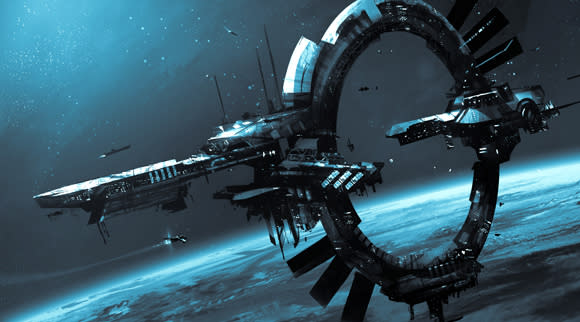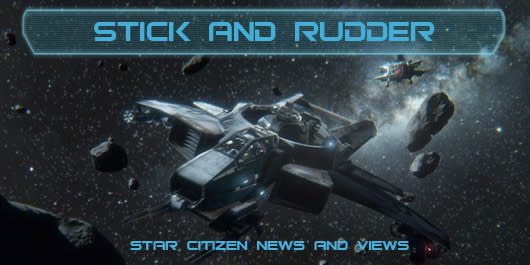Stick and Rudder: How Star Citizen is turning the game industry on its ear
When this column began, the first thing I talked about was Star Citizen's then-unique development model and how important it was both for fans and the game industry as a whole.
Over a year later, the jury's still out on whether or not Cloud Imperium's opus will bring balance to the Force and give starving hardcores a home of their own. It's already safe to say that Star Citizen has turned the industry on its ear, though.

If you're in a hurry, we can point to the game's $43 million crowdfunding warchest and close the book on this discussion. It's a ridiculous number, and it keeps getting more ridiculous on a daily basis. Plenty of triple-A games -- in fact, the majority of triple-A games -- have been made for less, and Star Citizen is hovering somewhere around most-expensive-games-of-all-time territory.
That it's the only game in such rarified air that's entirely fan-funded is of course the reason that it's turned the industry on its ear.


But the influence goes far deeper than numbers and the worries of value-subtracting middlemen. Star Citizen represents a cultural shift in game-making, if not in the everyday code-writing and asset production processes then at least in the way the evolving product is presented to the public. The industry has always had its share of rock star devs, but they typically exist in carefully controlled PR bubbles micromanaged by third-party ad firms that browbeat consumers with the desired message. Star Citizen's devs, on the other hand, are working under a microscope, and in the process they're changing the expectations of fans and journalists and influencing the workflow at other studios.
Don't believe me? Take a look at SOE's recent 12-hour H1Z1 livestream. Does anyone doubt that John Smedley and company watched CIG's marathon love-ins over the past year and decided that, yeah, we can buddy up with our fans and humanize our devs, too, and generate all kinds of goodwill and additional sales in the process?
Sure, SOE has been putting on its Las Vegas-based meatspace con for years now, but that's for the hardest of the company's hardcore fans. What we're seeing in the post-Star Citizen era is a firm that's laser-focused on connecting with its internet audience and casual hangers-on in more intimate and more frequent ways.
And SOE is just one example.


Was it a coincidence that CCP publicized its Valkyrie virtual reality project in August of 2013, well after Star Citizen exploded into the gamer consciousness and gave space sandbox fans an appealing alternative to EVE Online?
Maybe, but I doubt it.
Valkyrie is purportedly a side project cooked up by EVE devs who were riffing in their spare time. But since Star Citizen started getting more press as an unfinished prototype than EVE has gotten in its 11-year history, Valkyrie has become much more of a thing and much less of a here's-this-cool-aside-that-our-devs-were-doing-for-fun.
CCP has demoed the game at industry and fan events, it's partnered with heavyweights like Oculus and Sony, and it's generally done its best to say, "Hey, don't forget about us, dudes! We can do cockpits and dogfighting too if you want!"


For all the good that Star Citizen has brought to the game industry from a consumer's perspective, it's also brought some bad, or at least, it's accentuated some pre-existing bad and shown various bigwigs how they can further attack our collective wallet with little in the way of additional effort.
Yes, I'm talking about founder's packs, pre-ordering, and even crowdfunding in general. It's a bit of a personal Catch-22 because on the one hand, I see Star Citizen as a sort of for-the-people-by-the-people game. The devs building this game aren't marketers or MBAs; they are creators who actually want to play what they're creating, which is very obvious and infectious.
But -- and this is a large but -- they're still selling pixels that don't exist, and they're making a fortune by doing so. Call it naivete or hope or whatever you like, but I have a gut feeling that Chris Roberts and company won't abuse that privilege and will in fact deliver on most of their stated goals. I don't have that same confidence about the legions of other pre-alpha or early-access titles that are following suit. Even ArcheAge gives me pause. Yep, the same ArcheAge that I've been covering since 2010 and playing since 2011.
For good or ill, though, Star Citizen is leading this particular charge. If you divide $43 million by the 442,000 backers listed on the game's website, you can see that the average donation is right around a hundred bucks. Given Steam and various other outlets, this is equivalent to two or more quality triple-A titles that you can play immediately as opposed to one that you hope will be playable in the future.
Here in the Massively community, Star Citizen has become a polarizing game for a number of reasons, but what's undeniable is the fact that it is influencing the industry around it in substantial ways.


Whether it's interviews with Chris Roberts and the Cloud Imperium team or tips and guides for pushing your ship's performance envelope, Stick and Rudder is your inside source for news and commentary on the world of Star Citizen. Join Jef Reahard every other Sunday during the run-up to alpha, beta, and beyond.



